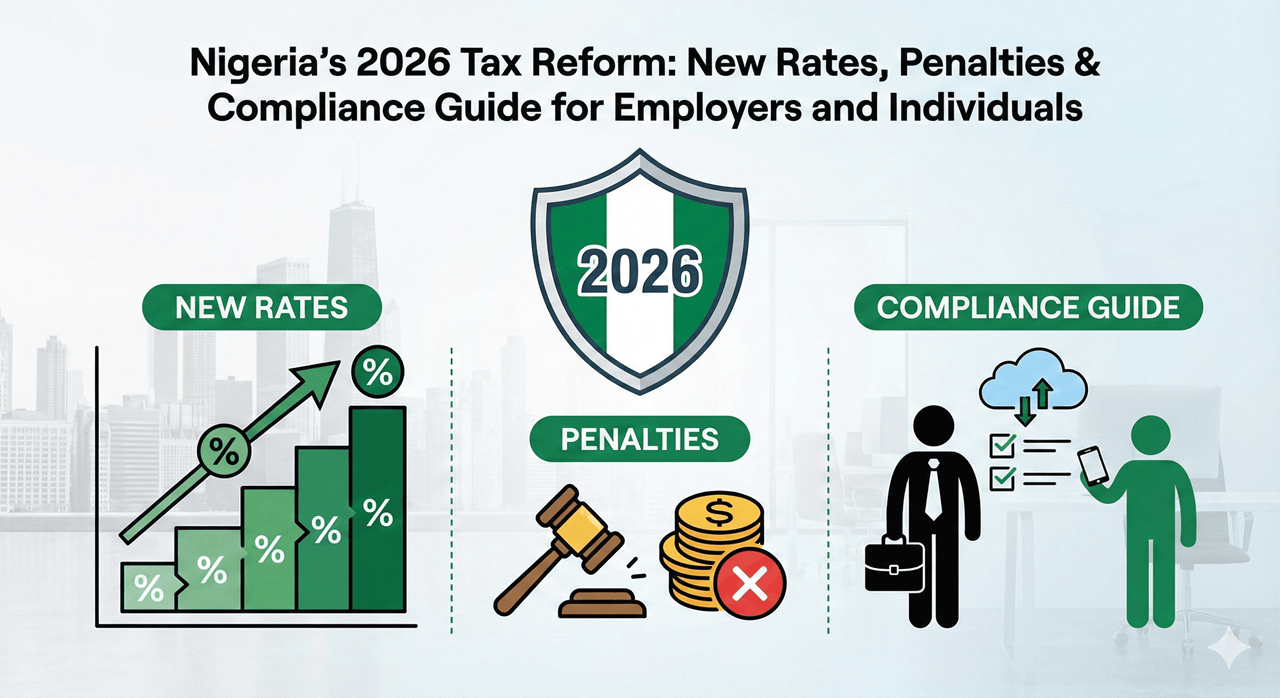How EOR Services Can Help You Save Up to 10x Annually in Nigeria

Introduction
In recent years, Nigeria has emerged as a prime destination for business expansion in Africa. With a population exceeding 200 million and a growing middle class, the country offers vast opportunities across various sectors, including technology, agriculture, and manufacturing. However, entering this promising market poses unique challenges, from navigating complex regulatory environments to managing payroll and compliance issues.
This is where Employer of Record (EOR) services come into play. An EOR acts as a third-party intermediary that takes on the legal responsibilities of employing staff in Nigeria, allowing foreign companies to enter the market quickly and efficiently. By leveraging EOR services, businesses can focus on their core operations while enjoying the advantages of local expertise without the burdens of direct employment management.
Cost savings are a critical consideration for companies looking to expand internationally. In Nigeria, businesses face numerous expenses, including recruitment costs, payroll management, and compliance with local labor laws. EOR services can significantly reduce these costs, allowing companies to save up to 10 times annually.
Overview of Nigeria’s Economic Landscape and Potential for Business Expansion
Nigeria’s economy is one of the largest in Africa, with a diverse range of industries and a burgeoning startup ecosystem. The country has abundant natural resources, a vibrant agricultural sector, and a growing tech landscape, making it an attractive location for international investments. According to recent reports, Nigeria’s GDP is projected to grow steadily, further enhancing its potential for business opportunities.
However, expanding into Nigeria is not without its hurdles. Companies must navigate a complex web of regulatory requirements, labor laws, and local market dynamics. These factors can create significant barriers to entry, making the need for efficient and effective operational strategies essential.
Introduction to Employer of Record (EOR) Services
EOR services provide a streamlined solution for businesses looking to enter the Nigerian market. By acting as the legal employer for your workforce, an EOR takes on responsibilities such as payroll processing, tax compliance, benefits administration, and handling employee contracts. This arrangement allows companies to hire local talent without establishing a legal entity in Nigeria, simplifying the expansion process.
Additionally, EOR services can provide valuable insights into the local market, helping businesses understand cultural nuances and compliance requirements. This expertise can be instrumental in navigating potential pitfalls and ensuring a smooth entry into the Nigerian market.
The Significance of Cost Savings in International Expansion
Cost control is vital for any business, especially when expanding into new markets. The expenses associated with international expansion can quickly add up, impacting a company’s bottom line. By utilizing EOR services, businesses can minimize these costs in several ways:
- Reduced Overhead Costs: Setting up a local entity in Nigeria can be expensive, involving legal fees, registration costs, and ongoing operational expenses. EOR services eliminate the need for this setup, allowing companies to redirect funds toward growth initiatives.
- Streamlined Payroll Management: Payroll compliance in Nigeria can be complex due to varying tax regulations and labor laws. EOR services handle payroll processing, ensuring compliance while reducing the risk of costly penalties.
- Access to Local Talent: Hiring locally through an EOR can save significant recruitment costs. EORs have established networks and can quickly identify qualified candidates, reducing the time and resources spent on recruitment.
- Focus on Core Business Activities: By outsourcing employment responsibilities, companies can concentrate on their core business operations, driving efficiency and growth.
The True Costs of Traditional Expansion into Nigeria
Expanding into Nigeria can be a lucrative opportunity for businesses seeking to tap into one of Africa’s largest economies. However, many companies underestimate the true costs associated with traditional expansion methods. Establishing a legal entity, managing operational overheads, navigating regulatory compliance, and accounting for hidden expenses can quickly escalate the financial burden of entering this vibrant market. In this article, we will explore these factors in detail to provide a clearer understanding of the true costs involved.
Establishing a Legal Entity
One of the first steps for businesses expanding into Nigeria is establishing a legal entity. While this may seem like a straightforward process, it often comes with significant costs and challenges.
- Registration Fees and Legal Costs: Setting up a legal entity requires various registration fees, including business registration, licensing, and permits. These costs can accumulate quickly and often require legal assistance, further increasing expenses.
- Time-Consuming Bureaucratic Processes: The process of establishing a legal entity in Nigeria can be lengthy and complex, often taking several months to complete. Companies may face bureaucratic delays, which can result in lost opportunities and increased operational costs during the waiting period.
Operational Overheads
Once a legal entity is established, businesses must consider ongoing operational overheads associated with running a company in Nigeria.
- Setting Up Physical Offices and Infrastructure: Businesses need physical office space to operate effectively. This involves renting or purchasing office space, furnishing it, and investing in necessary technology and infrastructure. These costs can be substantial, particularly in major cities like Lagos or Abuja, where real estate prices are high.
- Hiring Administrative and Compliance Staff: To manage day-to-day operations, companies must hire administrative and compliance staff. This includes human resources, finance, and legal personnel who are well-versed in local regulations. The costs associated with recruitment, salaries, and benefits can add up, further straining budgets.
Regulatory Compliance
Compliance with local labor laws and tax regulations is another significant cost factor that businesses must consider.
- Labor Laws and Tax Regulations: Nigeria’s labor laws are multifaceted and can vary by state. Businesses must invest time and resources in understanding these regulations to avoid costly mistakes. Non-compliance can lead to legal issues, resulting in fines and penalties that can severely impact the bottom line.
- Potential Fines and Penalties for Non-Compliance: Failing to adhere to local laws can result in hefty fines and penalties, which can be detrimental to a company’s finances. The risk of unexpected legal repercussions adds another layer of complexity to the expansion process.
Hidden Expenses
In addition to the more apparent costs of expansion, businesses should be aware of several hidden expenses that can arise.
- Currency Exchange Risks: Fluctuations in currency exchange rates can significantly impact costs, particularly for companies that need to convert foreign currency to Nigerian Naira for local operations. This risk can lead to unexpected expenses and complicate budgeting.
- Unforeseen Local Taxes and Fees: Nigeria has a complex tax structure, and companies may encounter unforeseen local taxes and fees that can affect their overall costs. These may include state and local government taxes that are not immediately apparent during the initial planning stages.
How EOR Services Deliver Significant Cost Savings
Elimination of Legal Entity Setup Costs
One of the most substantial barriers to entering a new market is the cost associated with establishing a legal entity. Traditional expansion methods often require a significant upfront investment in legal and administrative processes. EOR services help businesses bypass these costs through the following mechanisms:
- Saving on Incorporation and Registration Expenses: Setting up a legal entity in Nigeria involves various expenses, including registration fees, legal consultations, and licensing costs. These costs can quickly add up, making market entry a daunting financial commitment. With EOR services, businesses do not need to establish a separate legal entity; the EOR acts as the employer, effectively eliminating the need for these initial expenses.
- Avoiding Ongoing Costs of Maintaining a Local Entity: Once a legal entity is established, businesses face ongoing costs, including annual filing fees, local taxes, and compliance costs. These expenses can strain budgets, particularly for small and medium-sized enterprises. EOR services relieve companies of these financial burdens, as the EOR takes responsibility for compliance and ongoing administrative requirements, allowing businesses to focus their resources on core activities.
Additional Cost Benefits of EOR Services
In addition to eliminating legal entity setup costs, EOR services offer several other financial advantages:
- Streamlined Payroll Management: EORs handle payroll processing, ensuring timely and compliant payments to employees. This not only reduces administrative costs but also mitigates the risk of penalties associated with payroll errors.
- Access to Local Expertise: EOR providers possess in-depth knowledge of local labor laws and market conditions. This expertise enables businesses to avoid costly mistakes related to hiring and compliance, further enhancing cost efficiency.
- Flexible Employment Options: EOR services allow companies to hire employees on a contractual or project basis, providing flexibility in workforce management. This approach can lead to cost savings by allowing businesses to scale their workforce up or down as needed without incurring the fixed costs associated with permanent hires.
- Reduced Risk of Legal Penalties: Navigating the legal landscape in a foreign country can be challenging, and non-compliance can result in significant fines. By outsourcing employment responsibilities to an EOR, businesses reduce their exposure to legal risks, protecting their bottom line.
Reduction in Administrative Expenses
One of the most significant advantages of using EOR services is the reduction in administrative expenses. Businesses can achieve substantial savings by outsourcing various functions:
- Outsourcing Payroll, HR, and Tax Compliance: EOR services handle payroll processing, human resources functions, and tax compliance, allowing businesses to focus on their core activities. This outsourcing not only reduces the need for in-house HR staff but also minimizes payroll-related errors and the administrative burden associated with managing employee benefits.
- Leveraging EOR’s Existing Infrastructure and Systems: EOR providers have established systems and processes in place, which means businesses do not need to invest in developing their own infrastructure. This access translates to further cost savings and operational efficiency.
Mitigation of Compliance Risks
Compliance is a critical concern for companies operating in foreign markets, and failure to comply with local laws can lead to significant financial repercussions.
- Preventing Costly Legal Disputes and Fines: EOR services help prevent potential legal disputes by ensuring compliance with local labor laws and regulations. This proactive approach reduces the likelihood of facing fines or penalties, safeguarding businesses from unexpected expenses.
- EOR’s Expertise in Up-to-Date Local Regulations: EOR providers maintain a deep understanding of local employment laws, ensuring that businesses stay compliant with the latest regulations. This expertise mitigates risks and enhances operational security.
Flexibility and Scalability
The ability to scale operations quickly and efficiently is vital for businesses entering new markets.
- Adjusting Workforce Size Without Financial Penalties: EOR services allow companies to hire and lay off employees as needed without incurring the financial penalties often associated with traditional employment contracts. This flexibility enables businesses to respond to market changes promptly.
- Avoiding Long-Term Lease and Contract Commitments: By utilizing EOR services, companies can avoid long-term leases for office space and commitments to permanent staff. This flexibility helps maintain financial stability during uncertain times.
Faster Time-to-Operation
Speed is essential when entering a new market, and EOR services can significantly reduce the time it takes to become operational.
- Generating Revenue Sooner by Quickly Onboarding Employees: EOR services facilitate rapid hiring processes, allowing companies to onboard employees quickly and start generating revenue sooner. This efficiency can lead to a faster return on investment.
- Reducing Opportunity Costs Associated with Delays: Traditional expansion methods can lead to delays in hiring and operational setup, resulting in lost opportunities. EOR services mitigate these risks by streamlining the onboarding process.
Detailed Cost Comparison: Traditional Expansion vs. EOR Services
To illustrate the financial benefits of EOR services, a side-by-side comparison of expenses can provide valuable insights.
Case Study Analysis
- Comparison of Expenses Over a Year: A business considering traditional expansion versus using EOR services can expect significantly different costs in key areas. For instance, the legal fees associated with establishing a local entity can reach thousands of dollars, while EOR services typically charge a fraction of this amount.
- Highlighting Areas Where EOR Provides Savings Up to 10x: Key areas of savings include:
- Legal Fees: Traditional expansion may incur costs upwards of $15,000, whereas EOR services could reduce this to about $2,000.
- Staffing Costs: The cost of hiring HR personnel can exceed $50,000 annually, while EOR services often cover these functions for a fraction of that amount.
- Operational Expenses: Setting up physical infrastructure can cost tens of thousands, while EOR services often include infrastructure access at a much lower cost.
Breakdown of Savings
Quantifying savings across different functions can significantly impact overall profitability and return on investment (ROI).
- Legal Fees: Savings from avoiding incorporation and legal setup costs can range from $10,000 to $15,000 annually.
- Staffing Costs: By outsourcing HR and compliance, businesses can save between $20,000 and $30,000 each year.
- Operational Expenses: Reduced office overhead and related costs can yield savings of $15,000 or more annually.
Selecting the Right EOR Partner in Nigeria
As businesses seek to expand into Nigeria, partnering with the right Employer of Record (EOR) is crucial for ensuring compliance and operational efficiency. The choice of an EOR can significantly impact a company’s ability to navigate local regulations, manage payroll, and support employees effectively. This article outlines key considerations for selecting an EOR partner, due diligence steps to take, and the implementation process for EOR services.
Key Considerations
When selecting an EOR partner in Nigeria, consider the following factors:
- Experience and Track Record in Nigeria: Look for an EOR with a proven history of successfully managing payroll and employment compliance in Nigeria. Their familiarity with local labor laws and regulations can make a significant difference in your expansion efforts.
- Range of Services and Technological Capabilities: Assess the breadth of services offered by the EOR. A comprehensive EOR should provide payroll management, HR support, tax compliance, and employee benefits administration. Additionally, their technological capabilities should enable efficient management of these services, including an intuitive online platform for payroll and employee information.
- Transparency in Pricing and Contractual Terms: Ensure that the EOR provides clear and transparent pricing structures. Understand the costs associated with their services and any potential hidden fees. Transparent contractual terms will help avoid misunderstandings down the line.
Due Diligence Steps
Conducting thorough due diligence is essential to ensure that the EOR you choose aligns with your business needs. Follow these steps:
- Evaluating Client Testimonials and Case Studies: Review testimonials and case studies from other businesses that have used the EOR’s services. This feedback can provide insights into their reliability, customer satisfaction, and ability to meet client expectations.
- Verifying Legal Compliance and Certifications: Confirm that the EOR is compliant with local labor laws and possesses the necessary certifications. This verification is crucial to mitigate risks and ensure that your business is protected from potential legal issues.
- Assessing Customer Service and Support Mechanisms: Consider the level of customer service provided by the EOR. Effective communication channels and responsive support mechanisms are vital for addressing any issues that may arise during the partnership.
Steps to Implement EOR Services for Your Business
Once you’ve selected the right EOR partner, follow these steps to implement their services effectively:
- Initial Consultation and Needs Assessment:
- Defining Your Business Objectives and Requirements: Schedule an initial consultation to discuss your specific business objectives and requirements. Clearly outline your expectations regarding workforce management, compliance needs, and operational goals.
- Customized Service Proposal:
- Receiving a Detailed Plan and Cost Estimate: Based on your needs assessment, the EOR should provide a customized service proposal outlining the services they will offer, timelines, and a detailed cost estimate. This proposal should address how the EOR plans to meet your business needs.
- Onboarding Process:
- Seamless Transition for Existing or New Employees: The onboarding process should facilitate a smooth transition for both existing employees and new hires. The EOR should handle the necessary documentation, contracts, and compliance checks to ensure a hassle-free experience.
- Ongoing Management and Support:
- Regular Reporting and Communication Channels: Establish regular reporting and communication channels with the EOR to monitor performance and address any concerns. Ongoing support will help maintain a strong partnership and ensure that your business remains compliant with local regulations.
Conclusion
Selecting the right Employer of Record (EOR) partner in Nigeria is a critical step for businesses looking to expand into this dynamic market. By considering key factors such as experience, service range, and transparency, conducting thorough due diligence, and following a structured implementation process, companies can effectively leverage EOR services to streamline their operations and achieve compliance. With Remote Solutions Africa, businesses can focus on growth and innovation while ensuring that their workforce is managed efficiently and effectively in Nigeria.




































